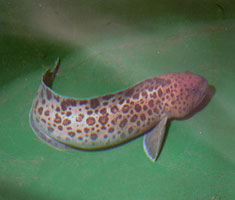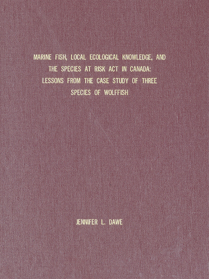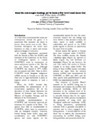
Community - University Research for Recovery Alliance
Governing for the Future
Wolffish: Species at Risk

LEK interviews revealed that harvesters use the same methods to visually identify wolffish as are used in scientific studies. Research results showed that LEK is consistent with results contained in several public documents based on research vessel survey data and mobile sentinel data. In addition, harvesters reported changes in the seasonal distribution of wolffish and accounted for the opportunistic feeding nature of wolffish.
There are differing opinions about the SARA process, even within the fishing industry. In the case of wolffish, there is some evidence that the listing process has increased stewardship of the species and made harvesters more aware of safe release methods for the fish. However, there are many harvesters who question the science used by the Committee on the Status of Endangered Species in Canada (COSEWIC) and feel that the SARA legislation is too strong. Conversely some key informants interviewed for this research voiced clear frustrations regarding weaknesses in the SARA and COSEWIC processes. Delays in decision-making, in the submission of species assessments, and in the allocation of funds, as well as a lack of LEK in assessments impairs, some feel, the effectiveness of SARA.
For additional findings see the linked reports.
Researchers and Partners
Lead Researchers:
Barbara
Neis
Dave Schneider
Lead Community Partners:
Kathleen Blanchard
Catherine Hood
Intervale
Associates
Student:
Jennifer Dawe, M.Sc. Environmental Science
Interns:
Melanie Quinlan
Other Partners:
Fish Food and
Allied Workers Union (FFAW)
Materials

Evaluating Canada's Species at Risk Act: A Case Study of Three Species of Wolffish In the Northern Gulf of St. Lawrence
Jennifer Dawe (2010). M.Sc. thesis, Environmental Science Department, Memorial University of Newfoundland.

Marine fish, local ecological knowledge, and the Species at Risk Act in Canada: lessons from a case study of three species of wolffish
A plain language research report by Jennifer Dawe, Kathryn Goetting, and Barb Neis. February 2011.
Community Radio Interviews
Kathleen Blanchard discusses her experiences with the CURRA project with Ivan Emke.
Interview during the Cow Head Community Radio Broadcast, May 2008.
Photos
 |

|
 Marine Station
Marine Station

